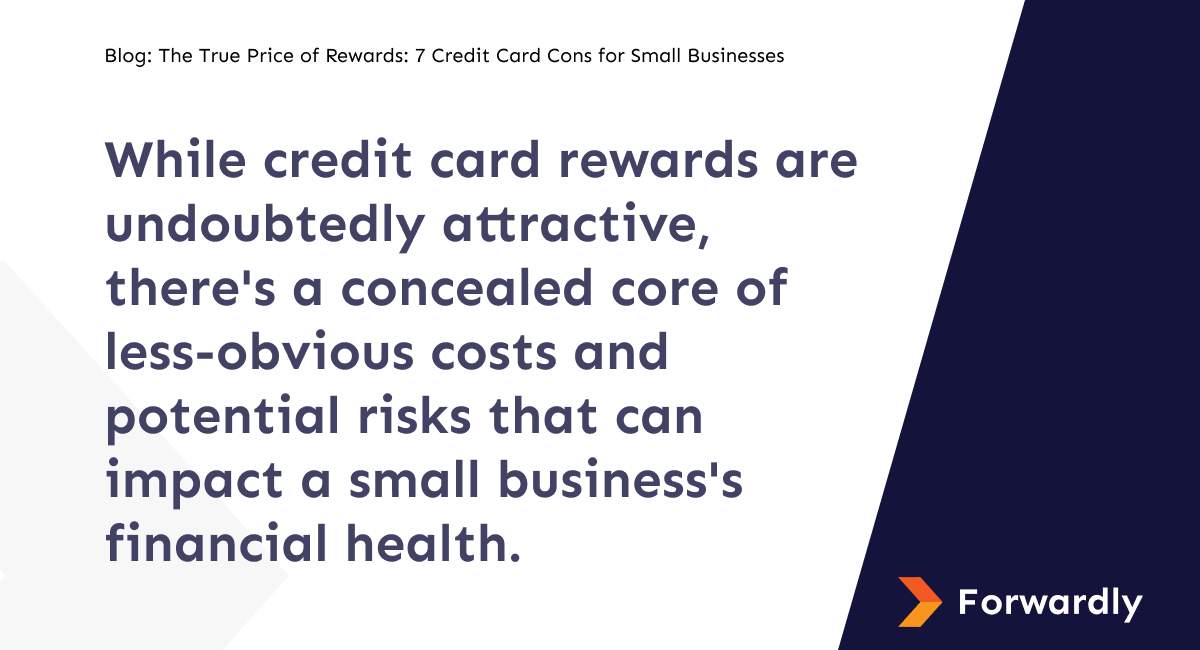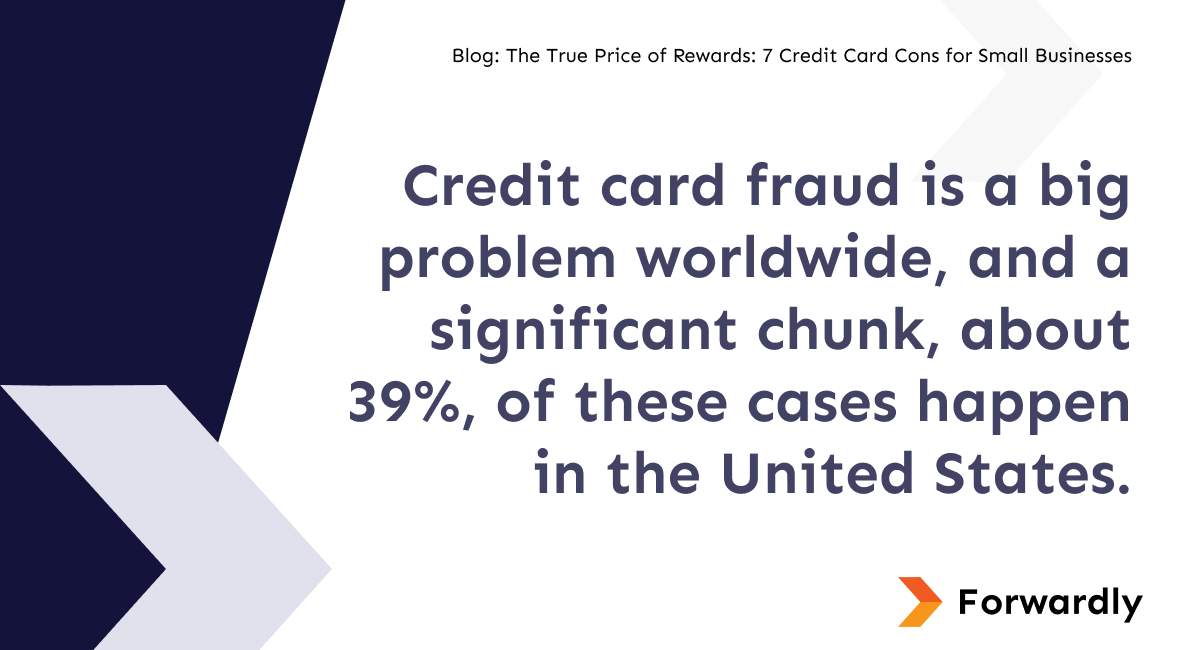Credit card rewards have a magnetic appeal to consumers and small businesses alike. Who wouldn’t want to earn cash back, travel miles, or other perks while paying invoices or making everyday business payments? It sounds like a win-win, right? At first, it seems like a great deal. It’s almost like getting something valuable without paying for it—a particularly alluring prospect for businesses operating on tight budgets. These rewards can provide a financial boost, offering extra funds to cover bills or invest in business growth. Credit cards make handling money easier and can act like a virtual assistant for tracking expense categories. Plus, some rewards, such as instant cashback, provide quick satisfaction.
It’s essential to recognize that credit card companies excel at marketing these perks, making them sound irresistible while often concealing associated costs and risks. Like most things in the business world, there’s more to the story than meets the eye. The rewards are tempting, but weighing the hidden costs of credit card cons and considering alternative payment methods to make the best financial choices for your small business is essential.

Less-obvious costs of credit card rewards
Credit card rewards are like a shiny apple, tempting and appealing on the surface. They promise enticing above-stated benefits for small businesses. While credit card rewards are undoubtedly attractive, there’s a concealed core of less obvious costs and potential risks that can impact a small business’s financial health. Let’s find out these hidden aspects of these credit card cons:
Annual fees: One of the less obvious costs that often lurk behind credit card rewards is the dreaded annual fee. Not all cards have them, but the ones with better rewards usually do. These fees can vary from small to large, depending on what the card offers. Small businesses need to decide if the rewards they’ll get are worth the annual fee. If not, it could hurt their finances.
Interest rates: High-interest rates are one of the major cons of credit cards. Many businesses use credit cards to pay for expenses and often carry a balance from month to month. The average credit card interest rate is 24.08%, and if your small business falls into this category, the interest rates can quietly erode any benefits gained from the rewards. To make the most of rewards and avoid extra costs, it’s important to pay off your credit card balance in full each month. Otherwise, rewards may not be worth it.
High processing fees: Using credit cards can mean extra charges called processing fees, and these fees can become a more significant issue in international business transactions. Business payments can have high fees, sometimes up to 4%. Businesses usually pass these costs to the paying client, particularly for larger transactions.
Cash flow constraints: Small businesses need a reliable cash flow for their day-to-day operations. Yet, using credit cards for business payments can introduce delays, especially for B2B payments. These delays can lead to cash flow issues, potentially hindering the ability to cover immediate expenses and pursue growth opportunities. Real-time payments are a better option for small businesses to resolve this cash flow issue.
Opportunity costs: In pursuit of rewards, small businesses might overlook vendor discounts, early payment incentives, and the chance to negotiate better terms with suppliers. Some suppliers prefer non-credit card payments and may offer better deals to businesses using those methods. Small businesses should think about whether getting rewards from credit cards is better than keeping good relationships with suppliers and buying things wisely.
Overspending to earn rewards: The desire to earn rewards can create a temptation for small businesses to overspend. Some businesses may make unnecessary purchases or inflate expenses intentionally to reach reward thresholds. This can lead to financial strain and affect the overall financial health of the business.
Frauds and security risks: Credit card fraud is a big problem worldwide, and a significant chunk, about 39%, of these cases happen in the United States. Additionally, when it comes to fraud in B2B payments, credit cards have been responsible for a hefty 60% of the losses over the last five years. These facts highlight the importance of understanding the risks connected to credit card reward programs, especially in business deals. When small businesses use credit cards, they can become targets for bad actors who want to exploit any security weaknesses. These risks can lead to money problems, damage a company’s reputation, and require expensive investigations to fix the fraud. So, it’s important for small businesses to focus on strong security measures and explore safer ways to pay for business transactions.

Exploring payment alternatives
As small businesses seek to steer clear of the cons associated with credit card payments, a world of alternative payment methods awaits, with some offering efficiency or cost-effectiveness. Here are some noteworthy alternatives:
Checks: Checks are often considered a cost-effective payment method, as they typically involve lower processing fees compared to credit cards. Unfortunately, their cost savings can be overshadowed by their unreliability. Checks are prone to potential delays in processing and clearing, insufficient funds, and the need for manual reconciliation. These factors can lead to cash flow challenges and disrupt business operations. In an age where instant and secure payment methods are available, checks, while cheaper on the surface, may not offer the efficiency and dependability that modern business payments require.
ACH: ACH can be a cost-effective option for many businesses due to its lower transaction fees when compared to credit cards. However, affordability often comes at the cost of speed and reliability. ACH payments are slow, sometimes taking many business days to clear. They are also susceptible to insufficient funds, which can lead to delays and cash flow gaps. Now that real-time transactions are becoming the norm, the reliability and speed of ACH payment whether standard or instant ACH transfer, may occasionally not meet the expectations of both businesses and their customers.
Instant Payments: Instant payment options are taking the business world by storm, and for good reason. Firstly, they provide businesses with the fastest possible access to funds, ensuring improved cash flow and liquidity. Instant payments settle in seconds instead of weeks, and because they process so quickly, they eliminate the risk of disputes common with credit card transactions. Instant payment options also often come with lower transaction fees compared to credit card processing fees, translating to cost savings for businesses. Overall, the speed, security, and cost-effectiveness of instant payments make them a preferred choice for accountants and businesses looking to streamline their payment processes.
Sign up for better finances
The world of payment alternatives for small businesses is expanding. Each option brings its set of benefits, making it essential for small business owners to assess their unique needs and objectives. By exploring these alternatives, businesses can mitigate the hidden costs and risks associated with credit card payments, enabling more informed financial decisions and optimized operations for long-term success.
Modern payment platforms such as Forwardly have emerged as powerful allies for small businesses. Forwardly’s instant payments empower businesses to transact seamlessly and efficiently. It integrates with financial management tools, enabling businesses to simplify their payment workflows and gain insights into spending patterns. Forwardly supports The Clearing House’s RTP Network and the Federal Reserve’s FedNow Service. It helps you avoid credit card fees and high-interest rates with much lower or even zero processing fees.
Whether you’re a small business owner or an accounting firm, simplify your payments. Start making better financial decisions and leave behind the burden of credit card cons.
Sign up for Forwardly today and start getting paid in seconds.
 Back to Blog
Back to Blog


